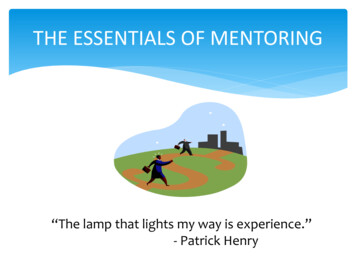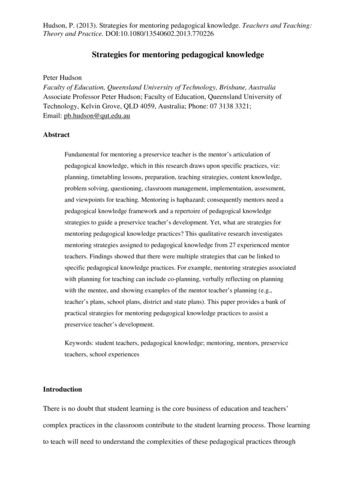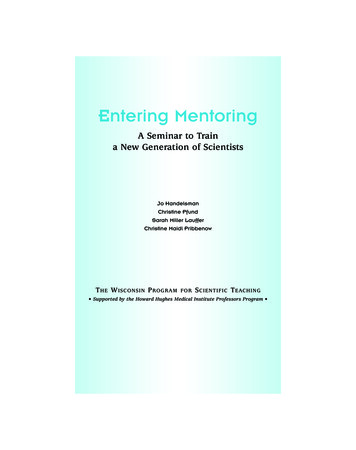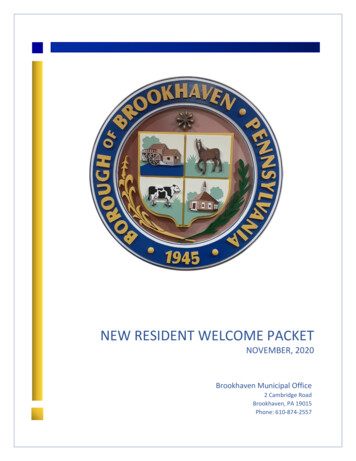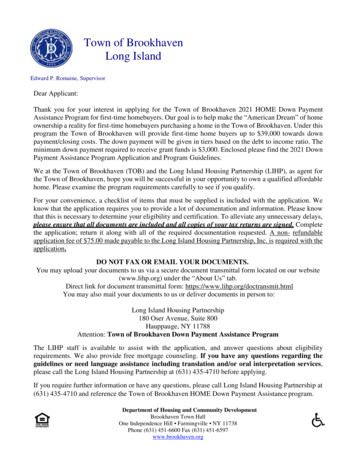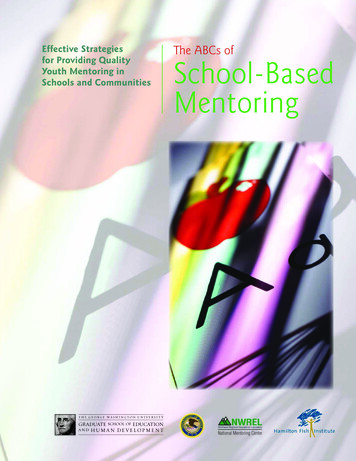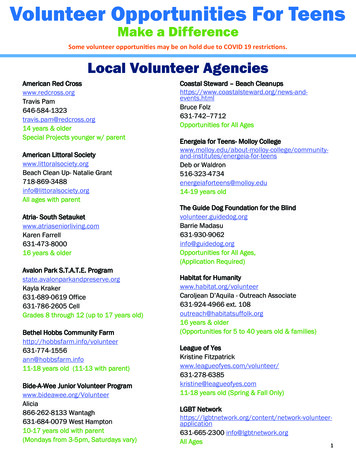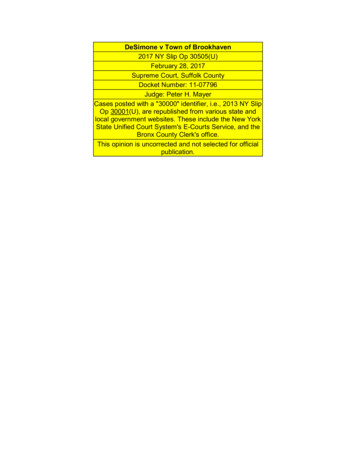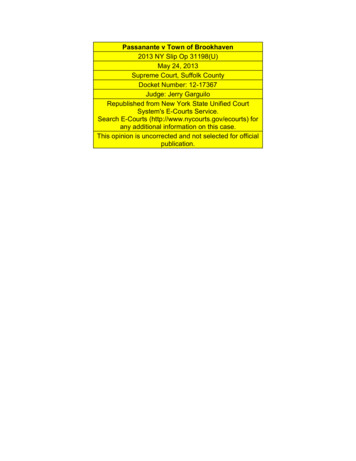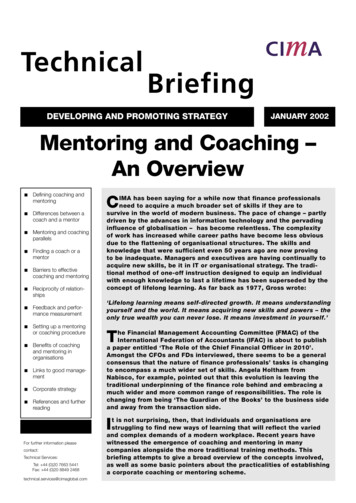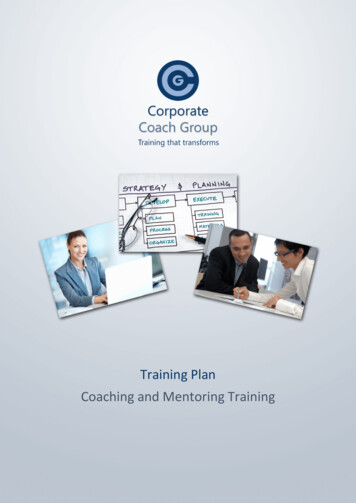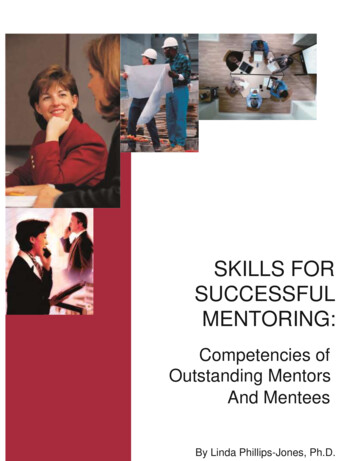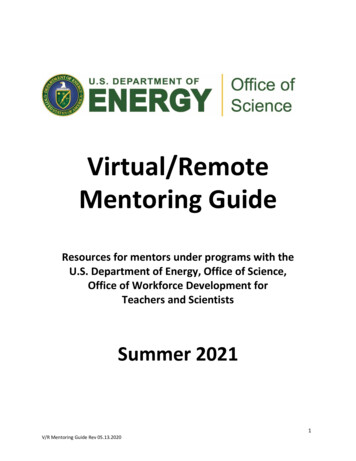
Transcription
Virtual/RemoteMentoring GuideResources for mentors under programs with theU.S. Department of Energy, Office of Science,Office of Workforce Development forTeachers and ScientistsSummer 20211V/R Mentoring Guide Rev 05.13.2020
With sincere appreciation for the work of the team established on behalf of the U.S.Department of Energy, Office of Science, Office of Workforce Development for Teachers andScientists (DOE WDTS) to develop a mentoring guide and tool kit in support of virtual/remoteinternships. These resources are provided to assist the DOE National Labs that continue toprovide internship experiences for the DOE WDTS programs during these unprecedented times.Lindsay Cullen, Argonne National LaboratoryLinda Lung, National Renewable Energy LaboratoryJulie Malicoat, Oak Ridge Institute for Science and Education/Oak Ridge National LaboratoryMary Lou O’Donnell, DOE WDTS Albert Einstein Distinguished Educator FellowNancy Roe, Pacific Northwest National LaboratoryEvangelina Shreeve, Pacific Northwest National Laboratory, ChairElizabeth Stephens, Pacific Northwest National Laboratory, Co-leadLisa Surles-Law, Jefferson LabAllison Truhlar, DOE AAAS Science & Technology Policy FellowAnn Wright-Mockler, Pacific Northwest National Laboratory, Co-lead2V/R Mentoring Guide Rev 05.13.2020
Table of ContentsContentsPreface . 6I.Preparing for Your Intern – Before Your Intern Begins . 71.Equipment for remote work . 72.Identify project background materials and begin planning . 73.Identify and prepare a remote mentoring team . 74.Reach out and begin building relationship . 8II.Week 1 - Getting Off to a Good Start . 91.Intern onboarding . 9Intern Onboarding Checklist – First Day/Week (see Appendix A) . 9Timesheets . 9Environmental, safety and health training and other required training . 9Reinforce Remote Operations Security (OPSEC) . 9Provide list of websites/links interns need . 9Remote Intern Agreements . 9Laboratory Workforce Development and Education staff . 102.Establish remote communication . 10Take advantage of teleworking technology. 10Introductions . 10Establishing Routines and Setting Expectations . 10Plan for successful remote working. 11Ensuring a National Laboratory level research experience . 12III.Week 2 – Community Building, Assessing, Readjusting . 131.Remote Community Building . 132.Ensure intern understands the basics . 143.Be aware and ready to adjust intern needs . 144.Providing constructive feedback remotely . 14IV.Week 3 to Two Weeks Before the End of Experience – Internship Progress . 161.Deadlines and Deliverables . 162.Engaging interns beyond their research. 163V/R Mentoring Guide Rev 05.13.2020
3.Identify opportunities for your intern to present . 164.Perform mid-experience check-in assessment . 17V.Wrapping-up the Internship – Last Two Weeks . 171.Deliverables . 172.Intern virtual symposium . 173.Equipment . 174.Checkout . 18Exit Checklist – Before End Date/Prior to Exit (in Appendix A) . 18Required Deliverables . 18Continuation or Termination . 18Mentor and Intern Survey . 185.Staying engaged, post-internship . 186.Communicate with WD/E during wrap-up/exiting process . 19Appendix A – Resources and Tools for Remote Mentoring . 20IT Equipment Checklist. 21Intern Onboarding Checklist . 23Internship Work Plan Template . 25Peer Mentor Guide . 26Quick Tips on Effective Remote Mentoring . 27Community Building . 28Operational Security (OPSEC) Telework Guide . 29Lab Websites and Links . 30Mentor – Intern Agreement . 31Guidance on Remote Communication for Mentors . 33Teleworking Etiquette . 34Remote Research Experience Standards . 37Meeting Check-in Guide . 38Warning Signs. 39Delivering Feedback . 41DOE WDTS Deliverables Guidance. 42Exit Checklist . 43Frequently Asked Questions (FAQ) . 44Appendix B – Optional Mentoring Resources. 454V/R Mentoring Guide Rev 05.13.2020
SMART Goals . 46Undergraduate Research Expectations . 47Mentor Expectations for the Remote Research Experience . 49Mentor-Mentee Expectations . 51FAST Constructive Feedback . 52Research Group Focus . 53Research Group Diagram . 54Reading Scientific Articles . 56Creating a Research Outline & Abstract . 58References. 595V/R Mentoring Guide Rev 05.13.2020
PrefaceThis summer, you and your intern(s) will participate in a remote internship experience that disrupts thenormal mentorship routines. You have committed to the placement and development of student internsand want to continue this practice, to the best of your ability, despite the challenge it presents. Thisguide is provided to help you navigate aspects of mentoring that may be more important than everand/or that may need to be modified for a remote experience. In addition to this guide, the WorkforceDevelopment/Education (WD/E) team at your laboratory may have additional support specifically formentors, whether targeted trainings, videos, meetings, or other materials.During these stressful and uncertain times, it is even more important to develop and maintain mentormentee relationships and provide support to the next generation of STEM professionals. The impacts ofa global crisis affect people in different ways, leaving some feeling frightened and overwhelmed, leavingsome unfocused and less productive, and leaving others less engaged. Mentors should provide a supportsystem for their mentees, encouraging them to stay actively engaged in a remote fashion but alsoprioritize their health over productivity – the same things expected of staff.Below we highlight a few best practices provided in this guide that can ensure active engagement andoversight with your student interns, while also providing the level of support that some individuals mayneed: Establish a pattern of regular communicationo Daily check-in conversationso Weekly mentor team engagemento Monthly progress reportsMaintain reasonable expectationsListen, don’t fixThroughout the experience focus on what’s important. Remember that the human and empathetic partof being a mentor is just as important as the technical interactions. Consider the health, safety, andmental well-being of student interns above all else.Thank you for agreeing to mentor an intern remotely this summer. You are providing a much-neededopportunity for students and recent graduates during a crucial time. In making remote internshipsavailable to students the Department of Energy National Laboratories are strengthening our collectivereputation and building strong relationships with our future workforce.6V/R Mentoring Guide Rev 05.13.2020
I. Preparing for Your Intern – Before Your Intern Begins1. Equipment for remote workIdentify the equipment and resources your intern will need to conduct their work remotely andto complete program deliverables. Work with your group administrator or others such as yourinformation technology (IT) representative for ordering needs and configurations. Make sure theintern is notified of delivery dates and knows whom to contact if items do not arrive as expected.2. Identify project background materials and begin planningRemote internships should provide enough remote work for interns to fulfill their programrequirements. Creating a full-time schedule of remote work can be challenging but considerthinking outside of the research project. Here are some example tasks for supplemental workthat still fulfill a high-quality research internship: If capable, have your intern pull together text for a review article or book chapter If funding support available, have your intern complete online/lab offered relevant class Collaborate with your team to identify other work in support of related projectsPrior to your intern’s onboarding, identify essential and supplemental project backgroundmaterials that will be helpful as your intern begins their research project. Consider sharingreading material, project details, research examples, related videos, etc. to introduce andacclimate your intern to the project. Please make sure your intern knows that reviewing thesematerials prior to their start date is optional.Consult with your orientation/onboarding team or the Laboratory’s WD/E team to verify therequired trainings that will be completed during orientation. Work with your training team toadd any training needed for the intern’s project work. For training that is typically held inperson, work with the training team to identify alternatives for a remote internship.Remote work will result in more independent work time for your intern so it is critical to havespecific work goals, especially in the beginning of the internship. You may want to begin tooutline week-by-week goals for your intern, based on the remote work you identify. However,avoid the temptation to plan out the entire internship in advance as the work plan should be acollaborative document that you develop and revisit often with your intern.3. Identify and prepare a remote mentoring teamFor most interns this will be their first remote work experience and they may need morecoaching and guidance than would be expected if they were physically “right down the hall”. Toensure that your intern has consistent support, regular check-ins and a variety of people with7V/R Mentoring Guide Rev 05.13.2020
whom to interact remotely, we suggest that you form a mentoring team with other members ofyour group.Schedule a meeting or meetings for the first week of your intern’s experience to introduce yourintern to the mentoring team, other group or project members, your team and group leads, andother interns in the group. You may want to collect brief introductory biographies and picturesof the mentoring and group team members and provide them to your intern for reference.As with traditional internships, an emergency point of contact needs to be identified in case ofyour absence or unavailability. Appoint someone on your team or in your division to be yourback-up to the intern. Ideally, introduce your intern to the selected person within the first weekof the internship.Refer to the Quick Tips on Effective Remote Mentoring and Community Building resources inAppendix A for further details.4. Reach out and begin building relationshipAs the start date for the internship approaches, you can reach out via email to begin building arelationship with your intern and preparing them to join the team. Provide your contactinformation and your preferred communication methods. If you are comfortable communicatingwith them via text or messaging apps, let your intern know that they may contact you that way.Confirm the intern’s start and end dates. If needed check with your WD/E team regarding howyour intern will connect for orientation and onboarding. Find out what time your intern will beavailable on their first day and let your intern know how and when you will remotely meet withthem to address questions and make plans for the week.Your manager or a mentor figure who manages employees would likely be willing to share thebest practices for managing remotely that they have picked up on-the-job recently. Before yourintern arrives, try to schedule a conversation with your manager or mentor to gain their insightson how best to manage your intern remotely. Some questions you may ask include:o How best to maintain employee engagement remotely?o How best to give feedback remotely?o Do they have any experience managing a new remote employee who has littlefamiliarity with a team and project?8V/R Mentoring Guide Rev 05.13.2020
II. Week 1 - Getting Off to a Good StartThis may be your intern’s first job and it is almost certainly their first remote work experience. Sharewith your intern what your experience with remote working has been like. This can be a good way tonormalize the experience (e.g., “At first I felt isolated from my colleagues”) and share any strategiesyou’ve used to optimize your remote working experience (e.g., “Identifying my work priorities eachmorning and setting a schedule has helped me stay productive”).1. Intern onboardingBelow are tasks that need to be completed to help your intern through their first week in aremote internship. Some of these will be covered during intern orientation, but reinforcementand review will help the intern retain the information. When appropriate, you may ask a groupadministrator or another member of your mentoring team to take care of some tasks. Intern Onboarding Checklist – First Day/Week (see Appendix A)If you have been provided with an onboarding checklist, make sure that all items on the listfor the first day/week are addressed by you, your group administrator or a member of yourgroup or mentoring team. Environmental, safety and health training and other required trainingDetermine the approximate time needed to complete each training module and help yourintern develop a schedule to complete all required training within a reasonable time.Reinforce the importance of safety even in their remote work environment. Reinforce Remote Operations Security (OPSEC)Review with your intern the appropriate use of government equipment. Share examples ofauthorized and unauthorized use of government equipment. The intern may be working in ashared space so help them plan how they will protect sensitive information if needed andmake sure they know what can and cannot be shared. Remind them to be mindful ofdocuments on their screen, what they post on social media, and to use headphones when inmeetings or talking with colleagues. Refer to the OPSEC Telework Guide (Appendix A) foradditional information. Consult your WD/E and Laboratory Cyber Security offices for labspecific guidelines. Provide list of websites/links interns needA suggested list of important Lab Websites and Links and contacts, such as payroll, IT supportand the WD/E team, has been provided in Appendix A of this guide. Review and update thelist with your project and lab websites/links/contacts and any others that are not included. Remote Intern AgreementsCheck with your WD/E staff about specific lab agreements the intern was required toapprove and sign. Please review and reinforce any signed legal agreement(s) to ensure theintern is fully aware of the expectations and consequences they have agreed to. Answer anyquestions the intern may have regarding the agreement.9V/R Mentoring Guide Rev 05.13.2020
You and your intern may want to document in writing your shared expectations for theremote internship experience. While not legally binding, such a document can contribute tothe success of the internship. In addition, should problems arise during the internship, thedocument may serve both to engage your intern in discussion and to aid discussions withyour WD/E team on next steps. A template for a Mentor-Intern Agreement is included inAppendix A. Laboratory Workforce Development and Education staffYour intern will have met some members of your Laboratory’s WD/E team duringorientation. Review the roles of the WD/E team in providing support and guiding the internon program requirements.2. Establish remote communicationDuring the first week take the time to establish a strong foundation of communication for yourintern with your mentoring and project teams. Include your manager and lab leadership whenappropriate. This will allow your intern to experience a fully engaged remote experience withyour lab. Your intern will learn some incredible skills during their remote internship, and this isthe time to employ strong communication skills that build trust using the following guidelines. Take advantage of teleworking technologyWe are fortunate to have technology that makes remote collaboration easier. Make sureinterns are comfortable with any approved online collaboration tools they need to use. Inlieu of being able to sit down next to each other at a computer, lean on utilities like screensharing to facilitate collaboration and aid discussions. Let your intern know whom to contactif they experience problems using or accessing any online collaboration tools. If needed,verify which online collaboration tools your laboratory has approved. IntroductionsNot all of us are in the same circumstance. Some interns will be sharing a space with others,others will have access to a private space to work, some may experience limited internetaccess and many will be in a completely different time zone. Getting to know your intern assoon as possible will be even more important than ever.Have at least one “get to know you” video chat with your intern in the first week. Ask abouttheir interests, likes, dislikes, educational goals, career goals, hobbies, family, etc. Shareabout your family, hobbies, career aspirations, education, and research goals.Lead or have someone else lead a meeting with video to introduce your group and/orproject team and share your organization chart. This allows the intern to see where yourteam fits in the lab. It is important your intern feels like a part of the team. Do this with yourmentoring team also. Create opportunities to introduce interns to other interns. Establishing Routines and Setting ExpectationsTalk to your intern about establishing core hours and a regular work schedule. Consider yourintern’s time zone and ask if anything may prevent them from following a set schedule.Suggest they use 8 a.m. to 2 p.m. Pacific Time (11 a.m. to 5 p.m. Eastern Time) as core hoursand then schedule their full work time over the core hours based on their needs.10V/R Mentoring Guide Rev 05.13.2020
Establish a cadence and method of regular communications. Let your intern know what todo if they will not be available on a given day or time (as for illness) and how you will letthem know if you will be unavailable during your regular schedule. Confirm that they knowwhom to contact when you are not available. Review the Community Building and Guidanceon Remote Communication documents (Appendix A) and implement some of thesuggestions to help keep your intern connected regularly.Go over some general remote work best practices from Telework Etiquette in Appendix A.Remind your intern that they should present a professional image even though they areparticipating remotely. Have a conversation about proper work attire for video meetingsand conferences. Mention how the image they share with others represents them asprofessionals, and therefore they should be mindful of their appearance and workspacebackground.Discuss your intern’s workspace. Their workspace should be conducive to a productive workenvironment with as few distractions as possible and that is safe for the intern (remindthem to check for tripping hazards, electrical safety, etc.). Refer to OPSEC Telework Guide inAppendix A for additional points. Plan for successful remote workingBelow is a Work Plan Template that you and your intern may use in collaboration todetermine week-by-week goals and tasks for the internship. The more guidance andstructure that the intern has, the easier it will be to keep them and the project on track.Week 1: Date - DateTheme(s)Goals(s)Task(s)The overall focus of the week (e.g., orientation,planning the project, learning new skills,conducting the experiment, analyzing data,preparing deliverables)Specific, Measurable, Attainable, Realistic, andTimely (SMART) goals to accomplish during theweek.The specific tasks that the intern (or the mentor!)will perform to accomplish the weekly goals.Copy the table above as many times as needed to cover the length of the internship. This isparticularly important when mentoring an intern remotely. See Appendix B for moreinformation on SMART Goals.You can find general mentoring guidance in Appendix B. Undergraduate ResearchExpectations and Mentor Expectations include questions to help you and your internaddress expectations and questions you might have about mentoring and the internshipexperience. Sample Mentor-Mentee Expectations can also be found in Appendix B. TheMentor-Intern Agreement (Appendix A) or a similar document can be used to facilitate aconversation between you and your intern to reach a common understanding ofexpectations for the internship. A document to help you deliver FAST Constructive Feedbackcan also be found in Appendix B.11V/R Mentoring Guide Rev 05.13.2020
Above all maintain reasonable expectations for your intern and yourself. Student internsgenerally participate in laboratory internships to learn and experience what it is like to doresearch for a living. Mentors provide a challenging but enjoyable experience that helpsinterns expand their current skill set. Mentors ideally create an environment where menteescan learn from their own mistakes and successes, as well as lean on the mentor’sexperiences. As such, student intern tasks should not be considered critical to the success ofthe project. More importantly, during these stressful and chaotic times, reasonableexpectations of delivery and completion of tasks should be maintained withoutdemanding heightened productivity of yourself or your student intern. Internships on theirown are stressful; participating through a remote experience for the first time is even moreso. No one should expect masterpieces or flawless execution by either intern or mentor.Break things down into smaller, manageable chunks and set reasonable targets. Ensuring a National Laboratory level research experienceThe primary goal of the intern’s experience is for them to feel they are a part of a nationallaboratory. The intern should begin to redefine themselves as a scientist and a part of aresearch team rather than just as an academic student.Please refer to Remote Research Experience Standards in Appendix A for the Department ofEnergy Workforce Development for Teachers and Scientists (DOE WDTS) accepted standardsfor a high-quality research experience with modifications for remote mentoring.12V/R Mentoring Guide Rev 05.13.2020
III. Week 2 – Community Building, Assessing, Readjusting1. Remote Community BuildingWorking remotely requires high levels of independence and discipline and can be isolating evenfor the most independent individuals. To help your intern combat the isolation they may feel attimes, build on the foundation for communication established in Week 1 with additionalCommunity Building (Appendix A) activities.Invite your intern, and encourage others to invite them, to meetings related to their project ortheir interests. During meetings do not ask interns to take notes, rather allow them to fullyengage in the meeting and invite their active participation. Most remote meeting applicationsprovide a way to record so that interns or others can later review the materia
your intern will connect for orientation and onboarding. Find out what time your intern will be available on their first day and let your intern know how and when you will remotely meet with them to address questions and make plans for the week. Your manager or a mentor figure who manages employees would likely be willing to share the
